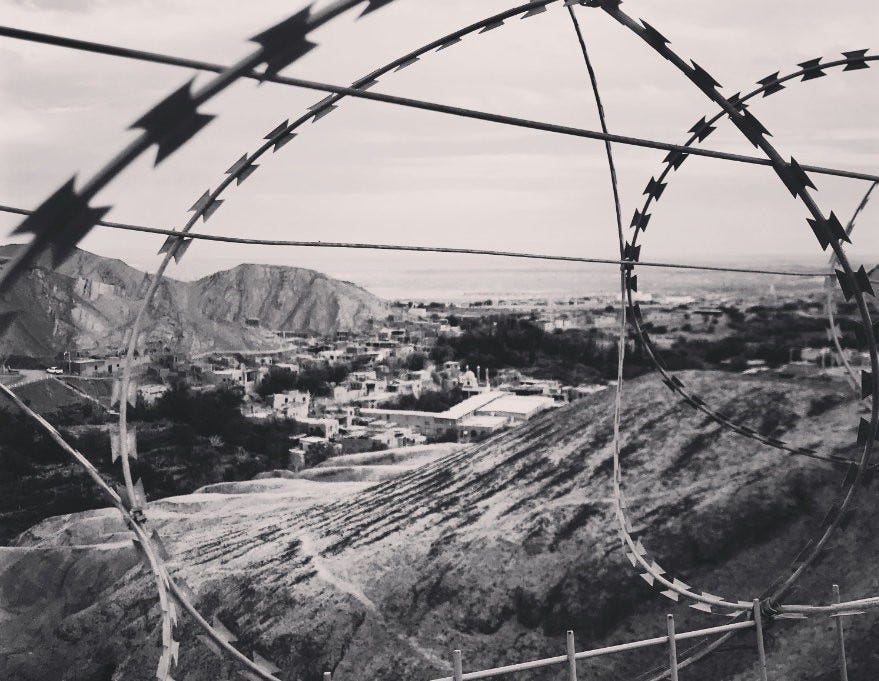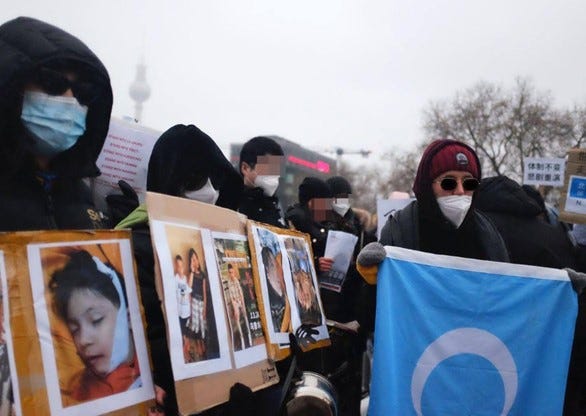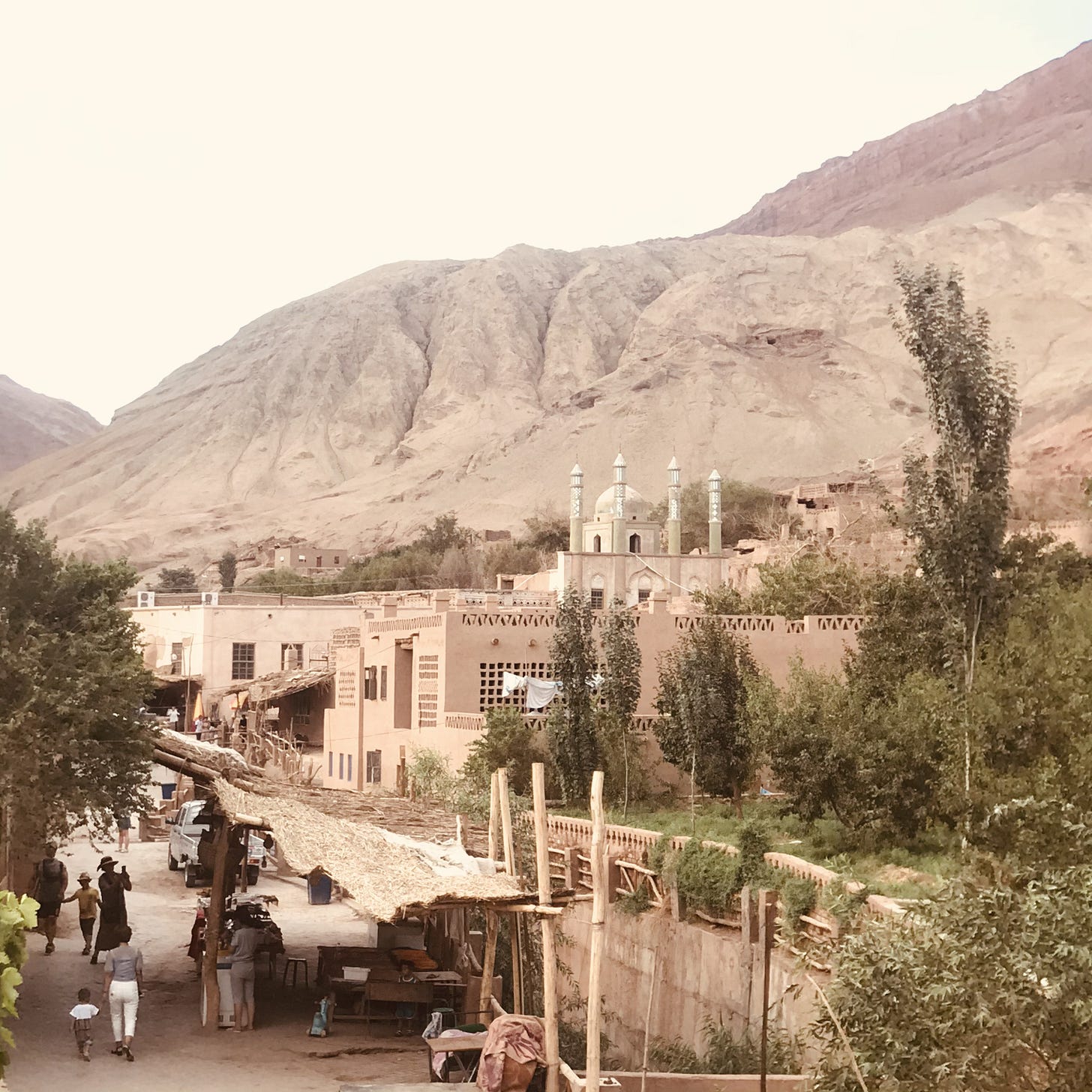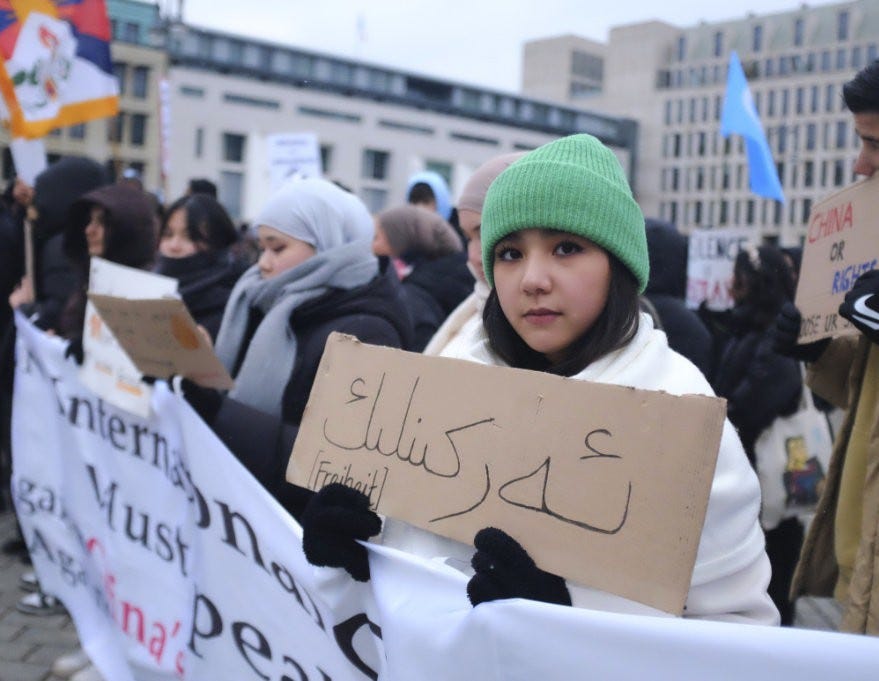Uyghurs Left in Lurch After Zero- COVID
The oppression of countless Uyghur people in China has been confirmed by many democratic countries. China has not only maintained its denial but has also severely blocked all information about it, in
The oppression of countless Uyghur people in China has been confirmed by many democratic countries. China has not only maintained its denial but has also severely blocked all information about it, in spite of repeated condemnations from Europe and the United States. A wide range of people in mainland China know very little about the real situation of their Uyghur neighbours. Mang Mang met a young Uyghur man who protested in front of the Chinese Embassy in Berlin on December 3, 2022. He tells Mang Mang the reason for his participation in the Chinese youth protest in recent months, as well as some words he had rarely spoken to Han Chinese.
▲ Photo by Erwin
Uyghur Boy (a pseudonym) is a 25-year-old immigrant who has been living in Germany since 2021. Wearing a blue vest with a star and moon pattern, the symbol for "East Turkistan", Mang Mang(莽莽)met him at a rally against China’s authoritarian rule in front of the Chinese Embassy in Berlin on December 3, 2022. Extremely cautious about protecting his identity and hiding his appearance, he repeatedly explains that he has to do so for the sake of his relatives and friends in China.
For Chinese protesters who have been on the streets recently, the possibility of the government going after them is a concern. But for Uyghur Boy, it is no longer only a matter of worry. He claims that his Uyghur relatives at home will be arrested if he reveals his identity.Uyghur Boy learned this only after fleeing China in 2016. First, he went abroad to study and then, after the journalists exposed large confinement facilities holding Uyghurs and other Muslim communities in China's Xinjiang Uyghur Autonomous Region (Xinjiang)and the increasing number of Uyghurs in detention, he decided not to return.
As representatives of Uyghur protesters, carrying a blue flag and wearing blue vests, Uyghur Boy and his friends quietly joined the Chinese protesters at the rally. They held eye-catching and extremely saddening posters with images of the Uyghur victims who died in the Ürümqi fire during the strict COVID-19 lockdown in Xinjiang and of suspected missing Uyghurs in China. Now, nearly two months have passed since the fire, and although the massive COVID lockdown is over, the freedom of the Uyghurs remains like a distant dream. The story of their suffering under Chinese rule was once again removed from the public's eye before it could be widely brought to mainstream Chinese attention.
Zero-COVID Tragedy Awakens Covered Plights
In early December 2022, China abruptly lifted all major zero-COVID measures without preparing medical resources and any effective preventive practices, such as ensuring vaccine effectiveness and vaccination rates. For now, many Chinese were caught up in the panic of losing the lives of their loved ones while regaining freedom after three years of harsh lockdowns.
The government’s decision to lift lockdown was supposedly sparked by protests across China. Following the deaths of Uyghur people in an apartment fire in Ürümqi on November 24, 2022, the capital of Xinjiang, various forms of protest against the zero-COVID policy erupted in Chinese cities. Many believe that the victims could have escaped the tragedy if there had not been a total lockdown of their building, including welded doors, for over three months. Since then, more than a few dozen protesters in China have reportedly been arrested or disappeared.
In this wave of condemnation of government policies, many overseas Chinese also demonstrated their solidarity with the people at home. By October 2022, following Peng Lifa(彭立发), a protester in Beijing against one-party dictatorship and the Zero-COVID policy, actions by Chinese youth in solidarity withPeng Lifa, and for democracy and freedom of speech, had begun to spread in several countries in Europe and the United States. Immediately after the Ürümqi fire, they echoed the protests in China by starting a new movement, the “A4 Revolution”. The protesters hold aloft a blank A4 sheet of paper to express their unspoken but conspicuous opposition to the Chinese government's strict censorship and authoritarian rule.
▲Uyghur protesters at the A4 Revolution rally on December 3, 2022, Berlin
Before the lethal fire in Ürümqi, Uyghur Boyhad never took a public stance on the issues in Xinjiang. Knowing that his family members could be arrested at any time if he revealed anything about their sufferings back in China, he chose to remain silent, expecting to see them again one day. However, three years of their gruelling confinement in China changed his mind. “Many Uyghurs still hoped to return to their hometowns before 2016, but gradually, especially after the COVID outbreak, we are seeing that the government's strong-arm tactics will only get stronger… for us to go home freely is impossible!” Uyghur Boylaments that he has realised that expecting China to change on its own is an illusion, “this is what leads us to speak out about our suffering, simply sitting back and waiting does not change anything.”
“East Turkestan Is My Hometown”
Personally, I am against the word “Xinjiang” (literally means the new frontier in Chinese) because it has been associated with so much suffering that has plagued our nation, so we call it “East Turkestan”,” Uyghur Boy explains to Mang Mang that the blue flag with star and moon represent the Islamic belief of Uyghurs and the “blue land” of Turkic people.
According to Encyclopedia Britannica, the Uyghur language is part of the Turkic group of Altaic languages. Uyghurs are considered among the oldest Turkic-speaking people of Central Asia, with an estimated 10 million in China and at least 300,000 people in total in Uzbekistan, Kazakhstan and Kyrgyzstan1. Situated at the crossroads of Europe and the “Far East”, after centuries of repeated division and integration, Uyghurs as a whole seem to have lost their political power in Central Asia for a long time.
Since the early 20th Century, the perpetual propagation of the idea of a distinguished ethnic identity as the “Chinese nation” (中华民族) dominated China. Except Han Chinese, who are the majority in China(The 2021 Chinese official census data shows that Han people is more than 1,2 billion, accounting for 91.11% of the entire population2), Uyghurs, and the other 54 ethnic groups in China (numerically provided by the Chinese authorities), are used almost exclusively as exotic cultural symbols to boost the conceit of the Chinese nation's diversity and inclusiveness.
Ever since the Chinese Communist Party(CCP) took power, the government has been pursuing a clear policy of assimilation in everyday life in Xinjiang, such as the mandatory use of Mandarin and strict censorship of religious practices. In the name of unity and peaceful coexistence, these coercive policies withdraw the best of each ethnic group's life and culture, which is the opposite of genuine pluralism.
Before participating in the anti-authoritarian protests in December 2022, Uyghur Boy did not have friends of Han Chinese. “I have never talked to a Han Chinese about our situations Uyghurs before, because many of them don't believe us and say we are liars,” Uyghur Boy continues, but “A4 revolution” makes this new connection possible, “Seeing the protests worldwide after the Ürümqi fire, I realise that there are Han Chinese who are different from the ones I remember.”
▲ Photo by Erwin
From Subtle Assimilation to Brutal Crackdowns
“Since the 1950s, the Communist Party has sent many uneducated and ignorant people to Xinjiang who have zero respect for our culture and beliefs,” a sudden burst of anger erupts in the Uyghur Boy's voice, “I remember when I was growing up, many Han Chinese would even mock us with extremely insulting remarks, such as, “Do you not eat pork because your ancestors were pigs?”
The era to which Uyghur Boy refers is the time of the military and reclamation movement in 1954. The Chinese word “Bingtuan”(兵团) is an abbreviation for the movement, which was formally known as the Xinjiang Production and Construction Corps (XPCC). The purpose of this state-owned corps was purported to focus on agricultural development in the arid and barren lands of Xinjiang.3Reports and analyses in recent years indicate the movement as a colonial-like move, and Uyghur Boy condemns the discrimination against Muslims in China that he assumes began at that time.
As a child, Uyghur Boy attended a bilingual Uyghur-Chinese school. “In the past, the Communist Party used a welcoming attitude toward ethnic groups China-wide to win our trust,” he remarks that in his grandfather's day there did not seem to be a widespread cultural cleansing campaign, but everything changed subtly. In his school days, Uyghur children were given separate communist study sessions every Friday (the day of Islamic worship) and were forced to eat and drink during the month of Ramadan, when they should be practising fasting. By the time Uyghur Boy graduated from elementary school, around 2010, all bilingual instructions in Xinjiang had disappeared. After 2017, when the Uyghur Boy settled in Turkey, more and more of his hometown friends were still in China and cut off relations with him for reasons of censorship.
When referring to the attitude of the Han Chinese towards Uyghurs today, Uyghur Boy notes: “I have to say that many Han Chinese do not listen to us. You can check their comments on the Internet about Uyghur people, and you will see… They even claim without proof that our accusations about what happened in the internment camps in Xinjiang were fabricated to obtain political asylum abroad.” Past experiences of neglect and discrimination in China made him find Han Chinese hard to communicate with and trust.
According to Uyghur Boy, life for Uyghurs under CCP rule has begun to deteriorate since 2016. Uyghur Boy describes a situation he witnessed the last time he was in Xinjiangaround that time. A Han Chinese man started an argument with an Uyghur man at a petrol station and two minutes later, a police car came and arrested the Uyghur man without even asking what was going on.
This was the time when Chinese authorities began to make mass random arrests of Uyghur and other Muslim communities. “I didn't even realise what the government was trying to do to us. It was only after I left China around 2016, and after I learned about the internment camps, that I came to understand the truth.” Uyghur Boy thinks that the previous measurements in schools and other public spaces that seemed at the timeless crucial were specifically aimed at Uyghurs and that they were by no means innocent or insignificant.
The “special” treatment of Muslim communities in Xinjiang seems to have foreshadowed the subsequent mass persecution. As the U.S. government and the media outlet “UyghurTimes” claim, China’s acts against the Uyghurs have amounted to genocide.
Evidence of Detention and Torture — The Xinjiang Police Files
Since 2016, when China began implementing the People's Republic of China Anti-Terrorism Law, there have been recurring reports of discriminatory measures against the Muslim population and their illegal detention. On November 16, 2019, the “Xinjiang Police Files” was released to the public by The New York Times. This series of confidential documents claimed to be from internal Chinese government sources, is the most detailed visual archive of violent detentions of Uyghur and other non-Han civilians in Xinjiang known to exist. In total, the archive contains more than a dozen internal Communist Party speech directives, more than 2,800 photographs of detainees and public security interrogations, 300,000 individual records, and more than 23,000 detention records and rosters.
Despite such a huge amount of evidence, the Chinese foreign ministry spokesman categorically said it was a clumsy way for the New York Times to take things out of context, Mr. Geng, the spokesman says: “The NewYork Times has not only closed its eyes and ears to the above facts (This refers to the Chinese government claims that thousands of violent terrorist incidents occurred in Xinjiang between 1990 and the end of 2016) but even used the clumsy tactic of taking the so-called internal documents out of context to smear China's anti-terrorism and de-extremism efforts in Xinjiang.”
According to a report in September 2022, by Human Rights Watch, the number of people sentenced and imprisoned in Xinjiang's brutal crackdown from 2017 until early 2022 reached half a million, as stated by its local authorities. Though the actual number is suspected to be much higher according to Human Rights Watch.
Three years after the exposure of the “XinjiangPolice Files”, on October 31, 2022, fifty countries, including Germany, the UnitedStates, the United Kingdom, Switzerland, Ukraine and Turkey, signed a joint statement expressing their concern about China's human rights violations in Xinjiang. After 14 international media, including Das Spiegel and Bayerische Rundfunk, confirmed the authenticity of the “Xinjiang Police files”, their statement indicates that crimes against humanity such as discriminatory and arbitrary detention, torture, sexual crimes, and forced sterilisation were suspected to have been committed against ethnic groups such as Uyghurs and Kazakhs in Xinjiang.
To date, however, many Uyghurs in China are still claimed to be missing or under harsh surveillance. The assessment of the human rights situation in Xinjiang by the UN Human Rights Office on August 31, 2022, concludes that there is evidence that after the large-scale concentrated “internment camps” for ethnic minorities such as Uyghurs, and serious human rights violations took place at least between 2017 and 2019. Moreover, there has been an increased tendency to extend detention periods in the name of “counterterrorism” and “counter-extremism” in Xinjiang, as the OHCHR assessment report states.
Where Is Hope?
Historical and recent Chinese demographic data seem to show the “achievement” of Sinicization of Xinjiang (Sinicization refers to the inevitable assimilation of non-Han people into Chinese.). According to the Uyghur HumanRights Project, when the Chinese Communist Party seized power in China in 1949, Han Chinese made up only 3% of Xinjiang’s population11. By 2020, that number had changed drastically, with China's official figures showing a total population of 25,852,300 in the region, of which 10,920,100, or 42.24%, were Han Chinese, while Uyghurs accounted for 11,624,300, or 44.96%, and other ethnic groups for 3,307,900, 12.79%.
Yet, there are many Han Chinese, especially those in China, who refuse to believe the report of Uyghur persecution and their testimonies, even though many photos and leaked documents from the “Xinjiang Police Files”, have been jointly proven true by multiple international mainstream media outlets.
On the one hand, for those who have never been marginalised or punished for their ethnicity, it appears hard to comprehend that for example, that merely using WhatsApp or a VPN, as some Uyghurs do, can lead directly to imprisonment in so-called “vocational education camp” (the official name of the internment camp given by the Chinese government). Not to mention the violence and torture Uyghurs are reportedly subjected to in detention. On the other hand, China’s strict censorship, particularly the terror controls in Xinjiang, has been pulling the wool over the eyes of the Chinese population for years to cover up human rights abuses committed by the authorities. Any voice on social media that criticises, satirises and questions the state's narrative can be removed in just a few minutes. This might explain why the fire in Ürümqi and the ensuing reaction were so important to the Uyghurs.
At a rally on Human Rights Day on December 10, 2022, a group of Chinese protesters of “A4Revolution” chanted “Free Xinjiang” and“Stand with Uyghurs”. For Uyghur Boy and other Uyghur protesters, although the Ürümqi fire was extremely saddening, it did awaken some Chinese people to face up to what has happened to the Uyghurs in Xinjiang.
▲ A Boy with his father on Human Rights Day on December 10, 2022, Berlin
Uyghur Boy eagerly goes on to express, “I understood that this is a very good opportunity for us to speak out about the crimes of the Chinese government and tell more people what is happening to us Uyghurs in China, why we are so frustrated with the CCP, and why we want to be independent!” Uyghur Boy tells Mang Mang: “When Chinese stood up against the communist government and showed respect for us, I noticed that some young Chinese don't seem to exclude other ethnicities anymore, and that changed my perspective a lot… so after seeing supporters of the “A4 Revolution” on social media, I immediately followed some of the protesters and got in touch with them.”
For the past few decades, the Chinese government has been constantly steering public opinion and increasing censorship. The establishment of internment camps in Xinjiang, for example, has been justified by the government as a way to prevent terrorism and religious extremism, rhetoric that can easily lead the public to associate Uyghur identity with terrorism and state subversion.
“I hope Han Chinese will not blindly label us terrorists and violent separatists and ignore the truth about our sufferings and internment camps in East Turkestan, just because they see our flag and our demand for independence…,” Uyghur Boy’s voice cracks slightly, “after decades of oppression and forced assimilation, we Uyghurs are painfully aware that we only have each other...”
Countering the CCP’s propaganda that reinforces prejudice and misconceptions between Uyghurs and Han Chinese is difficult. It requires mutual communication between the communities and readiness for self-reflection and criticism, which is by no means an easy process. Uyghur Boy also admits that it took him quite a long time to believe that not all Han Chinese are horrible to them. He adds: “Most of the problems between Uyghurs and Han Chinese are the result of misguidance by the Chinese government, as it adopts a so-called “divide and rule” policy over its population. But the truth is, it has been allowing ignorant Han Chinese to dominate Uyghurs while demonising us, thus creating the hatred between the ethnicities in China today.”
Nevertheless, Uyghur Boy says that he still hopes the virtually groundless and manipulated nationalist ignorance and hatred will one day be dissolved. At the end of the interview, Uyghur Boy tells Mang Mang that he agrees with some protesters that only when China is free will Uyghur people be free, and emotionally emphasises: “I hope more Chinese can understand and come to know us and talk to us. They will know that we are peace-loving people, and it was long discrimination, oppression and persecution by the Chinese government that made us realise that we had to take our lives into our own hands!”
Compromise and oblivion will never be an option for Uyghurs, no matter how small their voice may presently sound. China’s human rights violations against the Uyghurs and other Muslim groups do not seem to be ending. As the CCP keeps denying all the allegations, there are few avenues to investigate the whereabouts of the victims, and the Chinese authorities suspected of committing the crimes have not yet faced any legal consequences. The path to freedom for Uyghur people may still be lonely and rocky. When their vast homeland of more than 1.6 million square kilometres has been turned into a prison, the question of how to get out of this predicament is a difficult one. Sadly, however, as seen many times throughout history, for whatever reason, most people are accustomed to shutting their eyes to the suffering of others. And this is exactly what an authoritarian regime relishes.
▲ A Girl on Human Rights Day on December 10, 2022, Berlin
https://www.britannica.com/topic/Uyghur
第七次全国人口普查主要数据情况05.11.2021 http://www.stats.gov.cn/tjsj/zxfb/202105/t20210510_1817176.html
Xinjiang Production and Construction Corps: Safeguarding or Endangering Security? 15.Oct 2018 https://www.duihuahrjournal.org/2018/10/xinjiang-production-and-construction.html
China’s Oppression of Muslims in Xinjiang, Explained 27.July 2021 https://www.nytimes.com/2021/01/20/world/asia/china-genocide-uighurs-explained.html
https://www.xinjiangpolicefiles.org/
‘Absolutely No Mercy’: Leaked Files Expose How China Organised Mass Detentions of Muslims 16. Nov2019 https://www.nytimes.com/interactive/2019/11/16/world/asia/china-xinjiang-documents.html
18.11.2019 2019年11月18日外交部发言人耿爽主持例行记者会http://mz.china-embassy.gov.cn/chn/fyrth/201911/t20191118_6651102.htm
China: Xinjiang Official Figures Reveal Higher Prisoner Count: Half-Million Prosecuted, Imprisoned During Crackdown 14. Sep 2022 https://www.hrw.org/news/2022/09/14/china-xinjiang-official-figures-reveal-higherprisoner-count
31.10.2022 Joint Statement on Behalf of 50 countries in the UN General Assembly Third Committee on the Human Rights Situation in Xinjiang, China https://usun.usmission.gov/joint-statement-on-behalf-of-50-countriesin-the-un-general-assembly-third-committee-on-the-human-rights-situation-in-xinjiang-china/
31.08.2022 OHCHR Assessment of human rights concerns in the Xinjiang Uyghur Autonomous Region, People’s Republic of China.https://www.ohchr.org/en/documents/country-reports/ohchr-assessment-human-rights-concerns-xinjianguyghur-autonomous-region
The Bingtuan: China’s Paramilitary Colonizing Force in East Turkestan 04.2018 https://docs.uhrp.org/pdf/bingtuan.pdf P7
新疆的人口发展26.09.2020 http://www.gov.cn/zhengce/2021-09/26/content_5639380.htm
24.05.2022 Spiegel International: Data Leak Provides a Look into China's Brutal Camp System https://www.spiegel.de/international/window-into-a-police-state-data-leak-provides-a-look-into-china-s-brutal-camp-system-a-b81a6538-369d-4511-ac94-9b11c28a1f5a
▲ A Poster on Human Rights Day on December 10, 2022, Berlin






